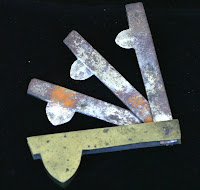As part of the Historical Fiction Virtual Book Tour for her latest novel, The Turning of Anne Merrick, I'm pleased to welcome author Christine Blevins to Confessions of an Avid Reader today. Thanks to Christine not only for her fantastic post, but also for the wonderful giveaway included with it.
I have been getting over a bad head cold this past week, and as I blew my poor red nose for about the 1,379th time, I thought about the word “catarrh” – the 18th century term for having a “cold” – and wondered at its origins. The word “cold” kind of makes sense… the word “catarrh” does not.
To the etymology dictionary, Chris!!
catarrh
late 14c., from M.L. catarrus, from L.L. catarrhus, from Gk. katarrhous "a catarrh, a head cold," lit. "a flowing down," from kata- "down" + rhein "to flow" (see rheum).
I am fascinated with, and collect interesting archaic words used in the 18th century. (My husband hates playing Scrabble with me.) I love discovering interesting words to weave into the narrative and dialog of my stories, and I find the terms that relate to illnesses among the most evocative.
During the War for Independence, more Americans died of disease than from bullets or cannonade. Infectious diseases like the bloody flux (dysentery), putrid fever (typhoid), consumption (tuberculosis) and ague (malaria) were rife in army encampments and on British prison hulks, and the mortality rate for those infected was very high. Adding to the misery, want of cleanliness and a decent diet caused soldiers to also suffer with parasitic infestations like lice and “the itch” (scabies).
(Image: Itchmite)
The cures of the day were sometimes worse than the diseases, and often contributed to the ultimate demise of the patient. Some of the herbal remedies employed were truly helpful, like the use of willow bark for fever, whose active ingredient, salicylic acid, is the basis of modern day aspirin; or warm poultices to ease congestion in the chest, or quinine to treat malaria.
18th century physicians preferred treatments that flushed or purged disease from the system. The go-to treatments included emetics to induce vomiting, and laxatives and enemas that caused… well, a different type of cleansing. “Blistering” involved application of a caustic solution to the skin to raise blisters – the thinking being the blisters drew out inflammation. Most people are familiar with the practice of bloodletting as yet another means to release poisons or “bad blood”.
(Image: Lancet)
Giveaway: 18th Century Notes and Envelopes – perfect for writing down your most effective remedies. The bundle is decorated with a feather quill and wrapped for convenient stowing in your medicine chest.
Author Christine Blevins writes what she loves to read – historical adventure stories. The Turning of Anne Merrick is the second in a 3-book series set during the American Revolution, and the companion book to The Tory Widow. A native Chicagoan, Christine lives in Elmhurst, Illinois, along with her husband Brian, and The Dude, a very silly golden-doodle. She is at work finishing the third novel inspired by a lifelong fascination with the foundations of American history and the revolutionary spirit.
Giveaway Details: This giveaway is open internationally. Just leave your name and email address in the comments field below to enter. Giveaway ends at midnight on February 24, 2012.
Thanks very much to Christine for stopping by!






















